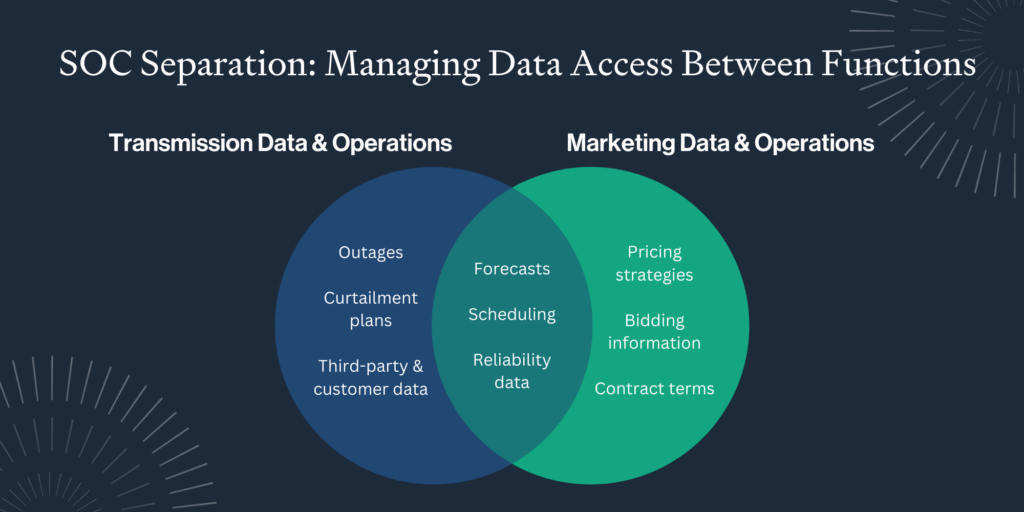Jia Yang, principal software analyst, contributed to this blog post.
In the era of electricity deregulation in the U.S., clear regulations around communications between utility transmission and merchant functions are essential. The Federal Energy Regulatory Commission’s (FERC) Standards of Conduct (SOC) aims to ensure open and fair market operations. But for many utilities, SOC compliance remains complicated and confusing.
This article breaks down requirements of the FERC Standards of Conduct for transmission providers and how utilities can comply in real-world operations. We’ll cover the regulatory basics, data sharing practices, and systems like e-Tagging and OASIS that facilitate adherence. With a clearer understanding of SOC and SOC compliance, utilities can more confidently navigate these critical regulations.
What are FERC Standards of Conduct and what is SOC compliance?
FERC Standards of Conduct for transmission providers are regulations that govern communications between a utility’s transmission and marketing departments. SOC compliance requires strict separation to prevent preferential treatment or unfair competitive advantage when transmission systems are opened to third-party generators.
Key FERC Standards of Conduct rules

FERC’s Standards of Conduct for transmission providers consist of three core regulations:
1. Independent functioning rule
This requires strict separation between transmission and marketing operations. Employees in each function must operate independently without coordination or sharing of non-public information. Physically separate facilities and reporting structures help maintain independence.
2. No-conduit rule
This prohibits transmission staff from passing any non-public operational information to marketing employees that could provide an unfair advantage. System controls limit data sharing to prevent improper disclosure.
3. Transparency rule
This requires transmission providers to post certain information publicly to allow visibility into their operations. Making transmission data and decisions transparent helps detect any potential instances of undue preference resulting from non-compliance.
Public data like transmission service requests, available transmission capacity, and locational marginal pricing can be published on OASIS. Internally, transmission and merchant staff may share forecast and scheduling data needed for reliability.
However, confidential transmission information and customer-specific data cannot be exchanged. Granular details about congestion or outages, curtailment plans, and third-party data could potentially provide an unfair market advantage if shared internally. Careful controls and separation help prevent breaches.
Adhering to all three components of FERC’s Standards of Conduct rules ensures transmission providers maintain fairness and prevent competitive advantages from arising through internal coordination. Understanding these core regulations is key for compliance.
E-Tagging systems support SOC compliance
E-tagging provides an important mechanism for coordinating electricity transfers between balancing authorities while maintaining separation. E-tags digitally track transactions, defining permissions for each party involved in moving power from generator to load.
By registering each participant with a specific role like Generating Plant Entity (GPE), Transmission Provider (TP), or Load-Serving Entity (LSE), e-Tags restrict data access only to authorized members of a transaction. This prevents confidential operational details from being shared inappropriately across merchant and transmission business units.
Real-world compliance in practice
Applying SOC varies based on each utility’s structure and regulations. Independent system operators (ISOs) and regional transmission organizations (RTOs) must fully comply, as they operate transmission systems that cover a large footprint and sometimes cross state borders. Vertically integrated investor-owned utilities also adhere closely to SOC.
Smaller municipalities or cooperatives may not be subject to SOC depending on size exemptions. And fully integrated systems without third-party generators on their network are less restrictive on internal data sharing, since no market competition exists.
While adherence to the FERC Standards of Conduct for transmission providers varies across utilities, the overarching goal remains the same: maintaining fairness and transparency in electricity markets. Understanding regulations is the first step toward effective, real-world solutions.
Navigating SOC compliance with confidence
For utilities struggling to interpret SOC requirements, expertise, and solutions from vendors like PCI can help bridge the gap. Our software for transmission management, e-Tagging, and more enables SOC adherence while optimizing grid operations.
With the right tools and knowledge, SOC compliance doesn’t have to be an obstacle. Utilities can confidently navigate regulations while driving efficiency and customer value. Learn more about overcoming transmission and market challenges with PCI’s expertise.






